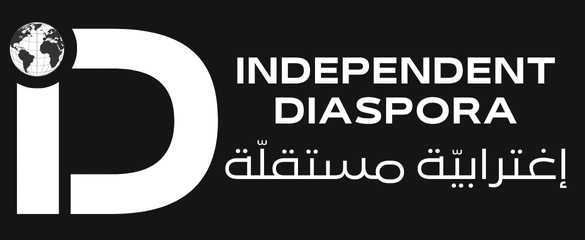
By Celine Mousleh
November 19, 2025
Master’s in Journalism (candidate) at Carleton University
Bachelor’s degree in Economics from the University of Ottawa
It’s early November, and the grass fronting the Embassy of Lebanon in Ottawa’s Glebe neighbourhood is slowly disappearing beneath the late-autumn snow. The Lebanese flag flutters proudly in the clouded sky at the edge of the lawn along Lyon Street South.
![The lawn outside the Embassy of Lebanon in Ottawa’s Glebe neighbourhood shows traces of snow after an early November storm. Next spring, hundreds of Lebanese-Canadian residents of Ottawa could be lining up at the building to cast their ballots in what’s expected to be a historic Lebanese general election. [Photo © Celine Mousleh]](https://independentdiaspora.org/wp-content/uploads/2025/11/2025-11-19-Celine-Mousleh-Embassy-of-Lebanon-in-Ottawa-1024x726.jpg)
The lawn outside the Embassy of Lebanon in Ottawa’s Glebe neighbourhood shows traces of snow after an early November storm. Next spring, hundreds of Lebanese-Canadian residents of Ottawa could be lining up at the building to cast their ballots in what’s expected to be a historic Lebanese general election. [Photo © Celine Mousleh]
In this building, which serves as the diplomatic mission of the Republic of Lebanon, a team of Lebanese Canadians hurries to provide people with consular services. This time, however, the embassy is receiving an unusual number of requests for a special event that happens every four years in Lebanon: legislative elections scheduled to take place in May 2026.
Between assisting people and awaiting the arrival of a new ambassador, the embassy has been cooperating with the Lebanese Ministry of Foreign Affairs to make sure expatriate voting in Canada runs smoothly in May, when lengthy lines of qualified voters are expected to flow into the embassy to cast their ballot.
On Oct. 2, the embassy announced on its website the start of the registration process for Canadians who also hold Lebanese citizenship and wish to vote in the May election. Voters can register electronically with the Ministry of Foreign Affairs and Expatriates. The registration deadline is set for Nov. 20.
![Cristine Kahil, founding member of the Lebanese Diaspora Exchange, shows her inked thumb after voting in Toronto in the 2022 elections. [Photo courtesy Cristine Kahil]](https://independentdiaspora.org/wp-content/uploads/2025/11/2025-11-19-Cristine-Kahil-225x300.jpg)
Cristine Kahil, founding member of the Lebanese Diaspora Exchange, shows her inked thumb after voting in Toronto in the 2022 elections. [Photo courtesy Cristine Kahil]
“The process is very simple and may take less than two minutes,” said Embassy Consul Ali Dirany. “So far, I have not heard complaints from people about the registration process. A very small number of people have been rejected for causes such as (missing) the required documents.”
Dirany asks people to avoid submitting documents such as a health card or a student card; instead, he advises them to use their Canadian passport, Permanent Resident card, or driver’s license.
There has been speculation around the possibility that the registration deadline could be extended to Dec. 31, but no extension has yet been approved by the Lebanese Parliament.
“You make your decision based on the best information you have, which is the deadline right now, 20th of November,” said Cristine Kahil, founding member of the Toronto-based Lebanese Diaspora Exchange and active member of a global organization, The Lebanese Diaspora Network. “So, go register to vote! Don’t wait for that other decision.”
It’s estimated that the Lebanese diaspora population around the world is as high as 14 million individuals. But most of them have outdated citizenship documents because they emigrated decades ago, thus, did not maintain their eligibility to vote. Up to 400,000 Canadians claim Lebanese heritage.
Kahil said that she helped people get into voting lines and make sure their documents were in order for casting a ballot at a polling station in Toronto for the 2022 Lebanese election.
“The most heart-wrenching part of the day,” she recalled, “was telling people they can’t vote because their ID had expired, and they were leaving crying.”
In the 2022 elections, 225,624 voters globally from the Lebanese diaspora registered, which is almost three times the number of voters registered in 2018. Canada ranked third in the number of registered Lebanese voters abroad, with 27,447 certified to vote, or 12 per cent of all out-of-country voters internationally.
The 2022 elections reflected a switch in political preferences, suggesting an increased mobilization in the diaspora for political change in Lebanon.
“The diaspora vote in 2022 was actually more of an impact than people think, and it was all done through volunteers and social media. Can you imagine if you got even more people involved?” said Kahil.
“In Lebanon, jobs, services, connections, and sectarianism all factor in when citizens vote,” explained Elie Matta, former representative of Lebanon’s nationalist Kataeb Party in Ottawa. “But Lebanese living abroad understand that for a state to be built, services, needs, and citizens’ rights must be accessible without them having to ask for them. Therefore, their voting should be based on who is best qualified to serve their country.”
Kahil added that the more the diaspora gets involved over time, the more they can contribute to real change in Lebanon.
There is uncertainty among Lebanese expats about whether they should register or not for the May election. One complication is the fact that the Lebanese Parliament is still weighing two possible scenarios for how expat votes would be distributed. One proposal is for the votes to be cast for just six MPs who would represent members of the Lebanese diaspora. The other proposal would be to distribute votes across the 128 seats in the Lebanese national legislature.
The wrinkle for would-be Lebanese-Canadian voters is that Canadian rules do not permit dual citizens to elect MPs directly for another country’s legislature, which is how the six-MP proposal would work. Canada does permit expat voters to cast ballots broadly in foreign elections across all seats of a legislature.
If the six-MPs approach is implemented, Lebanese-Canadian voters would have to travel to Lebanon to cast a ballot.
“We are encouraging people to register either way,” said Matta. “People who know that there’s a probability that they will travel to Lebanon around May, don’t register here. Otherwise, please register regardless of the uncertainty.”
The 2017 electoral law in Lebanon was the first to guarantee the right of “every Lebanese citizen not on Lebanese soil to exercise their right to vote.” However, it included Article 112, which, in addition to the 128 MPs, assigns six MPs specifically to represent the Lebanese diaspora – one for each continent. Many Lebanese citizens, both in Lebanon and abroad, criticized the clause for being unfairly restrictive.
However, Article 112 was not applied during the 2018 and 2022 legislative elections. The six diaspora MPs were not added to the total number of parliamentarians, and expatriates voted based on their district of origin in Lebanon.
It’s unclear if the clause will be applied for the 2026 elections.
“How could I know the MP representing me is not in another continent? Why would I replace the responsibility of 56 embassies onto six people? That makes no sense,” argued Kahil.
More than half of the current Lebanese MPs are seeking to overturn Article 112. In May this year, several lawmakers submitted a fast-track bill to Parliament that would allow the amendment of Article 112.
MP Georges Okais explained that to truly participate in political life, the Lebanese diaspora should be able to vote for 128 MPs according to the region of Lebanon they originate from, not just for six MPs. However, they have come up against the legislature’s Speaker Nabih Berri, who supports the law and has so far refused to add the amendment bill to the parliamentary agenda.
“The six MPs clause implies the cancellation of the diaspora voice,” argued Matta. “If we limit all the diaspora votes to only six MPs out of 128, they won’t have a voice in Parliament – that’s why we are fighting for 128 MPs, not just six.”
After a lot of pressure was exerted on the government to intervene, Prime Minister Nawaf Salam’s cabinet submitted a bill to suspend Article 112 for one time only, as in previous election cycles. Still, Berri has yet to add the proposal to the parliamentary agenda.
Kahil said she was moved earlier this year when Canada’s Parliament passed a bill declaring November Lebanese Heritage Month. The bill was sponsored by the Lebanese-Canadian MP and federal Immigration Minister Lena Metlege Diab.
“It just demonstrates how non-Lebanese love Lebanese… in the Parliament of Canada,” recalled Kahil. She added that Lebanese Canadians honoured in that moment will have a chance in May to help “lift Lebanon from its ashes” and “that’s why we need the diaspora to vote.”
Lebanese expatriates hold a demonstration at Lebanon’s Parliament in Beirut in July 2025, calling for the government to maintain expat voting across 128 legislative seats. [Photo courtesy TLDN]
![Lebanese expatriates hold a demonstration at Lebanon’s Parliament in Beirut in July 2025, calling for the government to maintain expat voting across 128 legislative seats. [Photo courtesy TLDN]](https://independentdiaspora.org/wp-content/uploads/2025/11/2025-11-19-Celine-Mousleh-Lebanese-expatriates.png)
Lebanese expatriates hold a demonstration at Lebanon’s Parliament in Beirut in July 2025, calling for the government to maintain expat voting across 128 legislative seats. [Photo courtesy TLDN]
The Lebanese government, embassies, political parties, and diaspora organizations continue to encourage expatriates to vote.
As of Nov. 12, eight days before the registration deadline, the Lebanese government announced that 51,685 applications from expats had so far been registered. In a joint press statement, the Lebanese ministries of the interior and foreign affairs invited expatriates to “register their applications before the deadline to assert their constitutional right to vote.”
“The more you are discouraged, the more important it is to actually register to vote. Why are people discouraged? Because they have no faith in the government system, the government is not functioning,” said Kahil. “Well, the government isn’t functioning because no one is taking the initiative to make it function. It’s like the chicken and the egg.”
Matta also urged the Lebanese diaspora to get qualified to vote: “Don’t lose interest! Our situation now is easier than it was when Lebanon was under the Syrian Assad regime. Giving up is not an option. We must continue trying to build a better Lebanon.”

